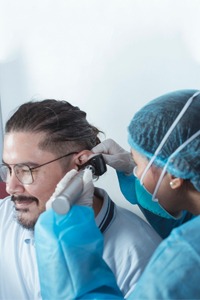HEARING TEST

What does a Hearing Test Check?
A hearing test can determine the kind and severity of your hearing loss.
An audiologist performs hearing testing. If you’re not sure if you have hearing loss, you can take an online hearing test, but it’s less accurate.
Most hearing tests determine how loud a sound must be for you to hear it. The outcomes are documented on an audiogram.
The importance of Hearing Tests
A hearing test is necessary to diagnose or confirm any type of hearing ailment or ear trouble that one is experiencing or developing. A comprehensive hearing exam can also assist in determining the type of hearing you have.
Types of Hearing Tests Offered – Paediatric/Age group wise
There are mainly two types of hearing tests offered.
- Adults and Older Children: Adults and older children are frequently subjected to a pure tone audiometry exam. This determines how loud various noises must be in order for you to hear them. When you hear a sound, you must indicate it. The audiologist will soften the sounds and record the softest sound you can hear.
- Babies and Younger Children: Babies and young children are subjected to different exams. Your child’s audiologist will select from a variety of tests that are appropriate for his or her age.
There are 2 main types of tests: behavioral and objective.
- Behavioral tests: Behavioral tests rely on your child doing something to show that they have heard a sound. For example, young babies might wake up or startle when the sound is played.
- Objective exams: Objective exams detect signals that indicate how well your child’s inner ear and hearing nerve are functioning. They are completed when your child is asleep. Older babies may require a little anesthesia to keep them motionless.
What does a Hearing test entail?
There are several kinds of hearing tests, from tests to see how well you hear to tests to see if you have something blocking your ear.
Most hearing tests check how loud a sound needs to be for you to be able to hear it. The results are recorded on an audiogram by an audiologist.
There are different types of hearing tests which check how well sound travels in different parts of your ear.
Pure Tone Audiogram
As the name suggests, this hearing test involves presentation of singular tones (pure tones) at different test frequencies through a transducer (generally it can be a headphone, a foam insert or a bone conductor) and establish the minimum level of tone which can be heard reliably and consistently and plot in on a graph known as audiogram. It is the most fundamental test for establishing your hearing levels. The audiologist is specialized to read the audiogram and understand what different patterns, different hearing levels, different configurations of hearing loss indicate about the individual’s hearing health as well as identify what abnormalities in the test suggest. Quite often different hearing conditions present with different hearing loss patterns, for example an active audiology audiogram pattern for someone with noise induced hearing loss will be distinctly different to someone who has hearing loss due to fluid in the middle ear.
Pure tone audiogram aims to establish hearing level as well as configuration of hearing loss which can either be sensorineural hearing loss, conductive hearing loss or a mixed hearing loss.
Speech Audiometry
Pure tone audiogram is often immediately followed by speech audiometry. It is complementary to pure tone audiometry, which only gives an indication of absolute thresholds of tonal sounds (peripheral function), whereas speech audiometry determines speech intelligibility and discrimination (between phonemes). It not only supplements and verifies the audiogram, but it is also often a crucial indicator of the functional aspect of hearing which can provide valuable information in terms of a patient’s ability to respond to hearing aid fitting and even determining candidacy of cochlear implant.
It involves presentation of recorded or live words to establish both the threshold as well as ability to distinguish the speech.
Tympanometry
Tympanometry is used to evaluate the integrity of the eardrum, the middle ear, the ossicular chain as well as the pressure of the middle ear cavity.
Audiologists insert a probe at the entrance of the ear canal until a seal is obtained and the test will cause a change in the air pressure of the ear canal as you hear some low-pitched tones. This pressure change feels similar to that felt during airplane travel, but only for a very short duration of a few seconds.
Tympanometry procedure is used to describe normal or abnormal middle ear function in conjunction with otoscopy and audiometry, to identify abnormalities such as the presence of middle ear fluid, tympanic membrane perforation and eustachian tube dysfunction, which have the potential to impact on hearing.
Acoustic Reflex Testing
Although often not considered an essential part of hearing assessment, this test involves measuring changes in ear drum compliance due to a middle ear muscle contraction in response to the loud auditory stimulus often above 80 dB. The test is a useful tool for the audiologist and ENT to correlate tympanometry findings, and in some cases, presence or absence of acoustic reflexes provides valuable information on auditory and facial nerve function.
What to Expect During a Hearing Test?
Our audiologists at Vital Hearing are experienced and provide the most thorough hearing assessments. We offer solutions for all age groups and are determined to provide a comfortable experience to our patients.
Our hearing test consists of the following steps:
- Listening: Our audiologist will take the time to listen, understand what problem you are currently experiencing and your history ,
- Conduct Test: Our audiologists will conduct comprehensive testing with the latest diagnostic equipment available.
- Analysis: At last, taking all your symptoms and discomfort into mind, our audiologists will provide you with a detailed report and solution tailored for your needs.
Why Choose Us for Your Hearing Test?
Vital Hearing And Balance Clinic is conceptualized on the premise that healthy hearing is vital to our communication and engagement with the environment. We offer a broad array of audiology services geared to address the most common hearing concerns.
The audiologists at Vital Hearing and Balance Clinic are accredited with Audiology Australia with years of extensive experience in both diagnostic and rehabilitative audiology roles with both kids and adults. Our goal is to improve and maintain your overall hearing health and to empower you with an understanding of hearing conditions.
Benefits of Regular Hearing Tests
- It may reduce cognitive decline. Early treatment of hearing loss may avoid any potential effect on the brain’s sound processing, leading to cognitive decline.
- Diagnosis of any pre-existing hearing conditions and alerting you to one or more associated medical conditions. For example, identifying and treating health problems like high blood pressure, which can be linked to tinnitus, may help to relieve any issues with hearing loss or future damage to the structures of the ear.
- Prevention of further hearing loss with early diagnosis and intervention. The earlier an audiologist can identify any issues through a hearing test, the easier the hearing loss is to treat. Treating problems when they first arise can prevent long-term and permanent damage to your hearing.
- Identify changes in your hearing levels over time. These may be difficult for you to notice as most changes are small. However, routine hearing tests with your audiologist enable your hearing to be monitored over time.
- Adapt to changes in your daily life. Lifestyle changes, like retirement, new hobbies, or family circumstances, often mean that your listening environment changes. It may be beneficial to change settings on your hearing aids or implants to enable you to hear better in these new circumstances. Equally important is to protect your hearing, for example, when starting a new job in a noisy workplace or using power tools.
- Reduce the emotional impact of hearing loss. Hearing impairment can negatively affect interpersonal communication. A regular hearing test will help avoid feelings of distress, frustration, anger, embarrassment, inferiority, shame, loss of identity, rejection, and loneliness caused by untreated hearing loss.
Book an Appointment
Hearing Test
To book an appointment for Hearing Test, fill in your details.
Contact us
- 0493 493 485
Fill in your Details
FAQ'S
An adult hearing assessment is a comprehensive evaluation of an adult’s hearing ability performed by a healthcare expert, generally an audiologist. It entails a battery of tests and procedures designed to assess an individual’s hearing thresholds, assess middle ear function, diagnose any hearing loss or abnormalities, and make suitable recommendations for further management or treatment.
Adult hearing tests include a thorough case history review, otoscopy (visual inspection of the ear canal and eardrum), pure-tone audiometry (measuring hearing sensitivity across different frequencies), speech audiometry (evaluating speech recognition and understanding), and additional tests like tympanometry (examining middle ear function) and otoacoustic emissions (measuring inner ear responses).
Adult hearing testing or evaluation is crucial for a number of reasons. First of all, it aids in identifying any hearing abnormalities or loss that can affect a person’s ability to communicate, quality of life, or general wellbeing. Early detection allows for prompt action, which may produce better results. It also serves in creating a baseline for future comparison and in tracking any changes in hearing over time.
For adults, a thorough hearing evaluation has many advantages. It aids in determining the kind and severity of hearing loss, enabling customized treatment options such as hearing aids, assistive listening technology, or other management techniques. Additionally, it can assist in identifying the root cause of hearing loss, which could help establish the best course of treatment if necessary. A thorough assessment also offers useful information for counseling and communication techniques.
Once the hearing assessment is completed, it will determine an individual’s hearing levels for any hearing loss. If the hearing test suggests normal hearing, generally there is no need for another test for another 2 years however if the hearing test indicate hearing loss, it is important to review hearing every 12 months. People with established risk factors for hearing loss, such as those who are exposed to loud noise at work, have certain medical conditions, or have a family history of hearing loss, could need more frequent evaluations. It’s always preferable to speak with a healthcare practitioner to decide when hearing tests should be scheduled based on individual circumstances.
Testimonials




